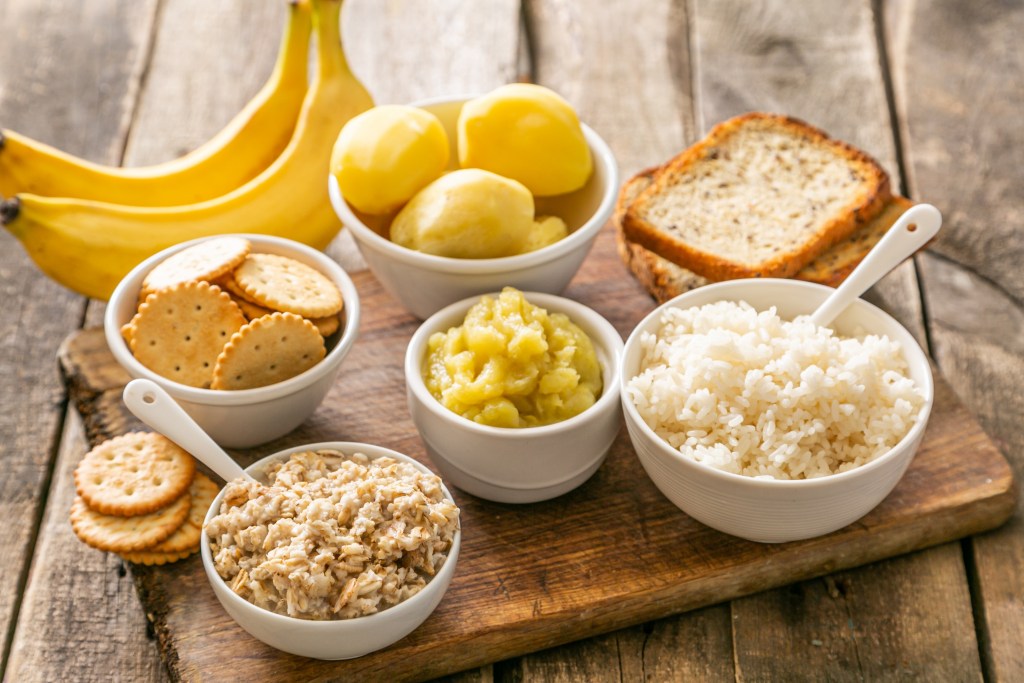Toddlers are always so active and curious and they’re constantly touching things then putting their hands near their mouths and eyes, which means they, unfortunately, tend to pick up a lot of germs. Sometimes those germs can lead to an upset stomach which may make your normally happy-go-lucky toddler, miserable. You can generally determine that your child has a stomach bug if diarrhea or vomiting is occurring, and you’ll want to do everything you can to provide much-needed comfort.
You never know when a stomach bug will strike, so parents of toddlers will want to make sure they have these five things on hand to help their little ones feel better.

What causes a stomach virus in a toddler?
If your toddler has a stomach bug, you can probably determine it is gastroenteritis. Gastroenteritis happens when germs infect the stomach or intestines and then cause vomiting or diarrhea. When it comes to children, Nemours Kids Health notes that gastroenteritis is most commonly caused by a virus that is shared either through touching something that has been infected, sharing a drink or food with someone who has the virus, or just living with someone who may also be sick. Gastroenteritis is typically caused by either the norovirus, rotavirus. or adenovirus. Norovirus is the most common culprit in children under the age of five. Fortunately, most stomach bugs will go away in a few days and won’t require any special medical treatment. Stomach bugs are incredibly contagious so you’re going to want to ensure you’re disinfecting areas where your toddler has been. The American Academy of Pediatrics recommends using soap, water, and in harder to clean areas a diluted bleach solution to try to prevent the spread of the virus.
What do you give a child with a stomach virus?
If your toddler has come down with a stomach virus you’re going to want to do everything you can to ease discomfort, fast. Here are five must-have things you’ll want for your sick toddler:
- Fluids: one of the biggest concerns with toddlers who have a stomach bug is dehydration, so you’ll want to make sure they stay hydrated. Plain water may not be enough as they may lose a lot of electrolytes when sick with a stomach bug, so an electrolyte drink like Pedialyte can come in handy. “For hydration, use a rehydration solution that’s available in any store and over the counter,” explained Isabel Rojas, M.D., a pediatric gastroenterologist at Children’s Health. “Start with small sips and increase gradually, so they don’t vomit it up.”
- Popsicles: it can be a struggle to get kids to drinks something and keep it down when they’re suffering from stomach bugs, so Healthline suggests giving frozen juice popsicles, popsicles made of an electrolyte drink, or ice chips to help them stay hydrated.
- Crackers: it may take some time for toddlers to keep food down, so you’re going to want to give them something that’s easy to digest and bland to start. Saltine crackers, bananas, applesauce, and soup are good starters.
- Rest: it can be hard to keep active toddlers down, but they really do need to rest to recover from a stomach bug. This is the perfect time to let them cuddle in bed with you, watch movies all day or play video games. Anything that keeps them happy and resting will help them to feel better, faster.
- Comfort: there’s nothing worse than when your toddler is sick, so giving your little snuggle bug a bit of extra attention and lots of comforts is necessary.

What settles a toddler’s upset stomach?
When it comes to stomach bugs, time is really the best medicine when it comes to settling unhappy stomachs. As mentioned above, a good electrolyte replacement can help ensure toddlers don’t become dehydrated, and once they can start to keep foods down experts suggest giving kids the BRAT diet of bananas, rice, applesauce, and toast to start.
“These foods are very easy to digest,” Dr. Rojas explained, adding, “Children can also have crackers or grilled or boiled chicken.” It may seem like second nature to run to the local pharmacy and pick up an anti-diarrheal medicine, acetaminophen, or ibuprofen, but experts typically warn against giving children these types of medicine for a stomach bug. As WebMD notes, vomiting and diarrhea are the body’s way of getting rid of the virus that’s making them sick, so if you try to stop that it may cause more harm than good. However, acetaminophen and ibuprofen can be used if your child has a fever. When in doubt consult your pediatrician. You’ll also want to avoid any fatty or spicy foods when your toddler is recovering.
How long do tummy bugs last in toddlers?
Thankfully, stomach bugs don’t tend to last too long for toddlers, or at least the worst of it. According to the American Academy of Pediatrics, vomiting tends to stop after about 24 hours, while Healthline echoes this stating most symptoms subside within 24 to 48 hours. However, they can last up to about eight days. If your child’s symptoms get worse or they haven’t subsided in just over a week or you’re concerned, you should consult your pediatrician.
Stomach bugs are never fully preventable but teaching your child to wash hands thoroughly and often, remembering not to share food or drinks with others, and keeping play areas disinfected are good ways to try to limit the spread.



